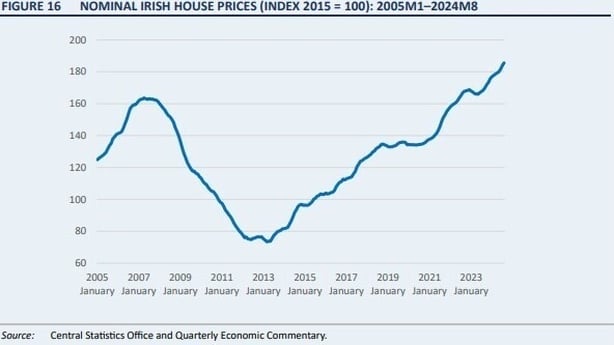Irish property prices are overvalued by 8% to 10%, according to the Economic and Social Research Institute (ESRI) in its latest Quarterly Economic Commentary.
The organisation analysed the value of houses and apartments taking into account prices, disposable incomes, interest rates, the supply of housing and the ratio of population in the key house purchasing age of between 25 to 44 years of age.
The ESRI said that an increasing number of households are carrying high levels of mortgage debt, which would leave them vulnerable in the event of a rise in unemployment or a fall in wages.
"The accelerated increase in house prices experienced so far in 2024 has led to concerns in the domestic market about the sustainability of such increases and the prospect of a painful correction such as that witnessed between 2007 and 2012," it said.
While it said the growth in credit is not as significant a factor as it was prior to the last crash it warned the Central Bank needed to be "particularly vigilant and prudent" when reviewing rules about mortgage lending.

Property prices rose by 10% over the past year and are now 14% above their boom-time peak in 2007, according to the Central Statistics Office.
The ESRI has also raised concerns about the effect of possible tariffs which may be introduced when Donald Trump returns to the White House next year.
We need your consent to load this rte-player contentWe use rte-player to manage extra content that can set cookies on your device and collect data about your activity. Please review their details and accept them to load the content.Manage Preferences
It warned the Government may have to cut planned spending next year if changes by the Trump administration "materialise more quickly than expected".
The institute said if tariffs were introduced by the US it could result in a decrease in world economic growth of 3.2% next year which would fully pass through to the Irish economy.
Read more: No indication that house prices will stop rising
It also said any retrenchment by US multinationals would affect wages, corporation tax and economic output.
But overall, the ESRI said Ireland's economic prospects remain positive.
It has predicted the domestic economy will grow by 3.2% this year and 4% next year.
It said the employment market will be particularly strong.
The institute added it expected real wages, or pay which adjusted for inflation, will rise by 4% next year.
The ESRI said Budget 2025 was be "broadly progressive" and households in the bottom 20% would see minor increases in disposable income.
Situation 'merits consideration' - ESRI
A Research Professor with the ESRI has said that the situation with Irish property prices and the level of debt households are taking on "merits consideration".
Kieran McQuinn made the claim citing the way trends are going with house prices not showing signs of ceasing their rise.
Speaking to RTÉ's Morning Ireland, Mr McQuinn said an overvalued housing market "is not sustainable in the longer term".
"House prices are very high, and I think in general in the economy it would be preferable if house prices were somewhat lower than the rate at which they are because they are taking up more and more of peoples' income in terms of mortgage repayments or rental levels," he said.
Mr McQuinn added: "I think in general there's probably a policy proposal there to try and get house prices and costs down over the longer term... While house prices are very high, we still think that that they're within the realms of what is justified or warranted by the fundamentals in the economy.
"But there's no getting away from the fact that they are very, very high in terms of the amount that they are taking out of peoples' income levels."
Mr McQuinn also said that while the economy is in a strong position, Ireland is "very much at the mercy" of global trade and any deterioration in that would have a negative effect on the Irish economy.
We need your consent to load this rte-player contentWe use rte-player to manage extra content that can set cookies on your device and collect data about your activity. Please review their details and accept them to load the content.Manage Preferences







